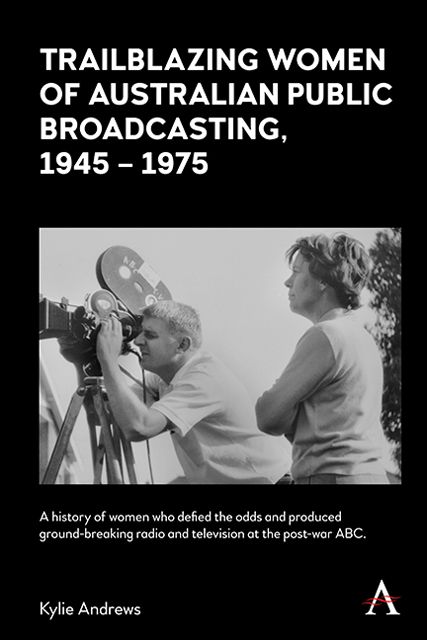Book contents
- Frontmatter
- Dedication
- Contents
- List of Figures
- List of Abbreviations
- Preface
- 1 Introduction
- 2 Career Snapshots
- 3 Welcome to the ABC, Ladies
- 4 The New Nation-Builders
- 5 Talent Was Not Enough
- 6 Thinking Outside the Box
- 7 Timely Escapes and Bittersweet Homecomings
- 8 International Adventures and Global Networking
- 9 Farewell to the ABC
- 10 Epilogue
- Reference List
- Index
- Frontmatter
- Dedication
- Contents
- List of Figures
- List of Abbreviations
- Preface
- 1 Introduction
- 2 Career Snapshots
- 3 Welcome to the ABC, Ladies
- 4 The New Nation-Builders
- 5 Talent Was Not Enough
- 6 Thinking Outside the Box
- 7 Timely Escapes and Bittersweet Homecomings
- 8 International Adventures and Global Networking
- 9 Farewell to the ABC
- 10 Epilogue
- Reference List
- Index
Summary
When I started writing this book, I had never heard of Kay Kinane, Catherine King, Therése Denny and Joyce Belfrage. Before becoming a historian, I worked for more than a dozen years in media production and, like so many of my female colleagues, was unaware of the achievements and efforts of my trailblazing predecessors. A few years ago, I was talking to one of Australia's leading film producers – a woman who started her career at the ABC in the 1970s – and asked if she had been inspired by any of the earlier generations of radio and television producers. She confessed she had never heard of them. Why have women been so absent in histories of media production? In the post-war decades, Australian broadcasting expanded into an increasingly complex and diverse industry, requiring a variety of workers and specialists. Surely, women workers made substantial contributions? The journey for this book began with a search to discover if the lack of women in Australian media history was, in fact, an accurate representation of their actual contributions over the decades. I discovered that for much of the twentieth century, Australia's media histories often ignore the contributions of women behind the scenes. As film scholar Annette Blonski lamented, ‘so much of our history exists merely as footnotes to accounts of the exploits of famous men’.
Early in my research, I came across ABC commentator Ellis Blain's 1977 memoir, Life with Aunty: Forty Years with the ABC. In the opening paragraph, Blain wrote, ‘Talking to some of the men who have shaped the ABC of today soon convinced me that I had been wise to avoid a commitment to a history in depth. Many of those who should have contributed to such an enterprise are already dead, and some of those who are alive make no secret of their determination that the mistakes, politics and intrigues will continue to rest in peace.’ When I read this, I was immediately struck by Blain's determination that it was men who built the ABC. I was also disconcerted by the preferred practice of ‘forgetting’ uncomfortable aspects of the past. It was a timely reminder of the need to revise the limited historical narratives which selectively celebrate the good and ignore the more complex aspects of an organisation's history, even one as well-intentioned as the ABC.
- Type
- Chapter
- Information
- Trailblazing Women of Australian Public Broadcasting, 1945-1975 , pp. xii - xivPublisher: Anthem PressPrint publication year: 2022

